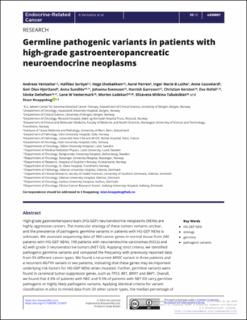| dc.contributor.author | Venizelos, Andreas | |
| dc.contributor.author | Sorbye, Halfdan | |
| dc.contributor.author | Elvebakken, Hege | |
| dc.contributor.author | Perren, Aurel | |
| dc.contributor.author | Lothe, Inger Marie Bowitz | |
| dc.contributor.author | Couvelard, Anne | |
| dc.contributor.author | Hjortland, Geir Olav | |
| dc.contributor.author | Sundlöv, Anna | |
| dc.contributor.author | Svensson, Johanna | |
| dc.contributor.author | Garresori, Herish | |
| dc.contributor.author | Kersten, Christian | |
| dc.contributor.author | Hofsli, Eva | |
| dc.contributor.author | Detlefsen, Sönke | |
| dc.contributor.author | Vestermark, Lene W. | |
| dc.contributor.author | Ladekarl, Morten | |
| dc.contributor.author | Tabaksblat, Elizaveta Mitkina | |
| dc.contributor.author | Knappskog, Stian | |
| dc.date.accessioned | 2023-11-15T07:25:25Z | |
| dc.date.available | 2023-11-15T07:25:25Z | |
| dc.date.created | 2023-09-08T13:03:54Z | |
| dc.date.issued | 2023 | |
| dc.identifier.citation | Endocrine-Related Cancer. 2023, 30 (10), . | en_US |
| dc.identifier.issn | 1351-0088 | |
| dc.identifier.uri | https://hdl.handle.net/11250/3102590 | |
| dc.description.abstract | High-grade gastroenteropancreatic (HG-GEP) neuroendocrine neoplasms (NENs) are highly aggressive cancers. The molecular etiology of these tumors remains unclear, and the prevalence of pathogenic germline variants in patients with HG-GEP NENs is unknown. We assessed sequencing data of 360 cancer genes in normal tissue from 240 patients with HG-GEP NENs; 198 patients with neuroendocrine carcinomas (NECs) and 42 with grade 3 neuroendocrine tumors (NET G3). Applying strict criteria, we identified pathogenic germline variants and compared the frequency with previously reported data from 33 different cancer types. We found a recurrent MYOC variant in three patients and a recurrent MUTYH variant in two patients, indicating that these genes may be important underlying risk factors for HG-GEP NENs when mutated. Further, germline variants were found in canonical tumor-suppressor genes, such as TP53, RB1, BRIP1 and BAP1. Overall, we found that 4.5% of patients with NEC and 9.5% of patients with NET G3 carry germline pathogenic or highly likely pathogenic variants. Applying identical criteria for variant classification in silico to mined data from 33 other cancer types, the median percentage of patients carrying pathogenic or highly likely pathogenic variants was 3.4% (range: 0–17%). The patients with NEC and pathogenic germline variants had a median overall survival of 9 months, similar to what is generally expected for metastatic GEP NECs. A patient with NET G3 and pathogenic MUTYH variant had much shorter overall survival than expected. The fraction of HG-GEP NENs with germline pathogenic variants is relatively high, but still <10%, meaning that that germline mutations cannot be the major underlying cause of HG-GEP NENs. | en_US |
| dc.language.iso | eng | en_US |
| dc.publisher | Bioscientifica Ltd. | en_US |
| dc.rights | Navngivelse 4.0 Internasjonal | * |
| dc.rights.uri | http://creativecommons.org/licenses/by/4.0/deed.no | * |
| dc.title | Germline pathogenic variants in patients with high-grade gastroenteropancreatic neuroendocrine neoplasms | en_US |
| dc.title.alternative | Germline pathogenic variants in patients with high-grade gastroenteropancreatic neuroendocrine neoplasms | en_US |
| dc.type | Peer reviewed | en_US |
| dc.type | Journal article | en_US |
| dc.description.version | publishedVersion | en_US |
| dc.source.volume | 30 | en_US |
| dc.source.journal | Endocrine-Related Cancer | en_US |
| dc.source.issue | 10 | en_US |
| dc.identifier.doi | 10.1530/ERC-23-0057 | |
| dc.identifier.cristin | 2173510 | |
| dc.source.articlenumber | e230057 | en_US |
| cristin.ispublished | true | |
| cristin.fulltext | original | |
| cristin.qualitycode | 2 | |

